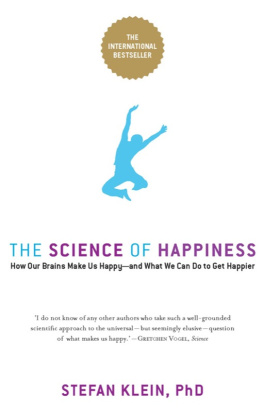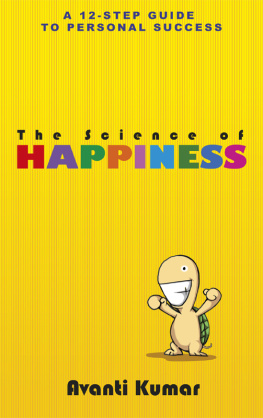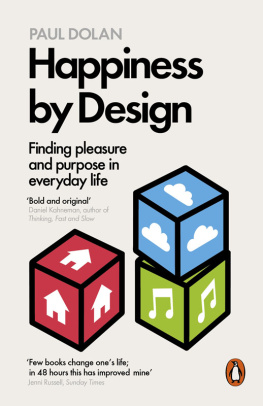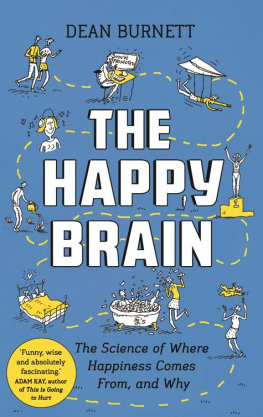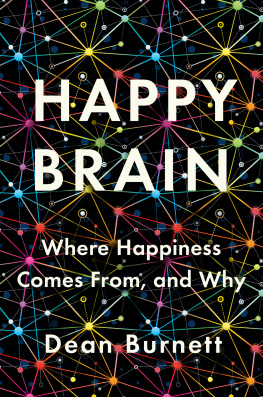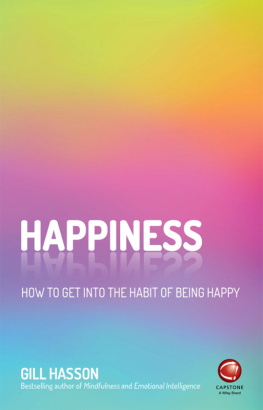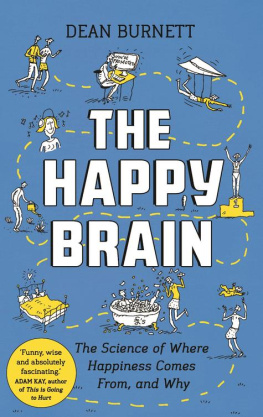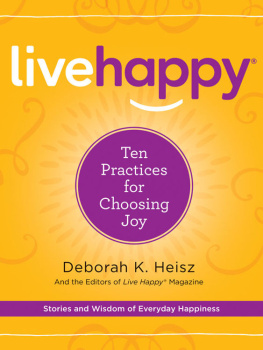
Scribe Publications
THE SCIENCE OF HAPPINESS
STEFAN KLEIN, P h D , considered one of the most infiuential science writers in Europe, has written for Germanys leading newspapers and magazines. He was science editor of Der Spiegel , a leading German newsmagazine, from 19961999, a staff writer with Geomagazine from 19992000, and is now a freelance writer in Berlin. He has interviewed many of the worlds most prominent scientists, including Antonio Damasio, Stephen Jay Gould, V. S. Ramachandran, Craig Venter, Ian Wilmut, and E. O. Wilson. In 1998 he won the Georg von Holtzbrink Prize for Scientific Journalism. He studied physics and philosophy at the universities of Munich and Grenoble and completed his PhD in biophysics in Freiburg. He is also the author of The Diaries of the Creation . He lives in Berlin and can be found online at www.stefanklein.info.
STEPHEN LEHMANN is a translator and the author of Rudolf Serkin: A Life .
Scribe Publications Pty Ltd
1820 Edward St, Brunswick, Victoria 3056, Australia
50A Kingsway Place, Sans Walk, London EC1R 0LU, United Kingdom
First published by Scribe 2006
This edition published by arrangement with Marlowe & Company, an imprint of Avalon Publishing Group, Incorporated, New York.
First published in Germany in 2002 by Rowohlt Verlag GmbH, Rheinbeck bei Hamburg.
Copyright 2002 by Stefan Klein
All rights reserved. Without limiting the rights under copyright reserved above, no part of this publication may be reproduced, stored in or introduced into a retrieval system, or transmitted, in any form or by any means (electronic, mechanical, photocopying, recording or otherwise) without the prior written permission of the publisher of this book.
The chart in chapter 15 appears courtesy of Ed Diener & Eunook M. Suh, eds.,
Culture and Subjective Well-Being , published by MIT Press.
Copyright 2000 Massachusetts Institute of Technology.
National Library of Australia
Cataloguing-in-Publication data
Klein, Stefan, 1965- .
The science of happiness : how our brains make us happy and what we can do to get happier.
9781922072481 (e-book.)
1. Happiness. 2. Pleasure. 3. Smile. I. Title.
152.42
www.scribepublications.com.au
FOR ALEXANDRA
CONTENTS
PART ONE:
PART TWO:
PART THREE:
PART FOUR:
EPILOGUE:
INTRODUCTION
EVERYONE EXPERIENCES HAPPINESS differently. For one person it means running barefoot through the dewy grass, for another its holding his baby in his arms. Sex can make people happy, as can a new outfit, a hotdog or Mozarts Concerto No. 13 for Piano and Orchestra. There are also people who find happiness in the very absence of all of this, as when a Zen monk experiences bliss by losing himself in emptiness.
What kind of feeling is happiness? Katherine Mansfield described a rapturous moment as being like a glowing slice of sun that one has suddenly swallowed. We all chase after this sensation, but it comes over us when we least expect itonly to disappear before we have a chance to enjoy it fully. Once again, there is no time left to look at happiness more closely and to uncover the rules that govern the game it plays with us.
In the spring of 2000, I visited the brain researcher Vilayanur S. Ramachandran. This brilliant and eccentric Indian-born scientist had caused a stir with his theory of a God module in the brain. Hed also cured amputees of their phantom pains by having them look into a set of ingeniously arranged mirrors. Newsweek named him a member of the Century Club, one of the hundred most influential people to watch in the new century. We discussed peoples lack of self-understanding, while he paced back and forth in his office among models of the brain, telescopes (hes an amateur astronomer) and statues of Hindu divinities: Ramachandran is a man who cannot sit still even for a moment. Suddenly he exclaimed in his melodious, Indian-inflected English, And we dont even know yet what happiness is!
That observation was the catalyst for this book. I wanted to know what happiness is. My own search for positive feelings certainly played a role in my hope that we could find happiness if we only knew where to look for it. I was also motivated by curiosity, which is an occupational disease of scientists and journalistsand I am both.
The deeper I dug into the subject, the more I read, the more I spoke with scientists, sages as well as ordinary people in Asia and in the West, the more convinced I became of a discovery that surprised even me: Ramachandran was wrong. We now know a great deal about what happiness is. Most of what we know, however, is very hard to find, scattered among countless scholarly articles, many of them difficult to learn about. There are other discoveries that have not even been published yetto say nothing of new insights being gathered and described in a way that anyone can understand and put to use. That is what I hope to achieve with this book.
Perhaps youre surprised to read that happinessthis complex, seemingly divine feelingcan be scientifically researched. We see nothing strange in the study of unhappiness. Clinical psychologists have long attended to unpleasant feelings, and for the past two decades or so brain researchers have become increasingly knowledgeable about the origins of anger, fear, and depression. An entire industry that sells pills against pathological dejection profits from their discoveries, as, indeed, do countless patients. But for a long time happiness was more or less shrugged off.
This has changed only recently. Brain scientists have begun to direct their interest toward positive feelings, and they are making rapid and impressive progress. Much of what until relatively recently was still science fiction is reality in todays laboratories. New imaging techniques enable us to observe the brain as it thinks and feels. They allow us to see, for example, how joy arises in our brain when we think of someone we love. Molecular biology reveals what subsequently transpires within our ten trillion brain cells, and psychological experiments show how these internal changes affect our behavior. We are forming an understanding of the ways in which positive feelings come into being.
We are now beginning to answer questions that people have always asked themselves. Is happiness more than simply the opposite of unhappiness? Is it genetic? Does the feeling of anger pass if you vent it? Is it possible to prolong the good moments? Does money make people happy? Can we stay in love with the same person all our life? What is the greatest happiness?
Central to answering these questions are two fairly recent insights of brain research. One concerns the parts of the brain that produce a sense of well-being: our brains have a special circuitry for joy, pleasure, and euphoriawe have a happiness system. Just as we come into the world with a capacity for speech, we are also programmed for positive feelings. This discovery will shape our understanding of mankind as powerfully as Freuds theories of the deep unconscious did in the last century.
The other, still more surprising discovery is that the adult brain continues to change. Until a few years ago scientists believed that the brain, like bones, was fully grown by no later than the end of puberty. But exactly the opposite is true: the circuits in our brain are altered whenever we learn something, and new connections are forged in our network of nerve cells. Using the right microscopes, we can even see these transformations within the skull. After you have read this book, your brain will look different than it did when you started.
These changes are triggered by thoughts, but even more by emotions. This means that with the right exercises we can increase our capacity for happiness. Much as we can learn a foreign language, we can train our natural aptitude for positive feelings.
Next page
